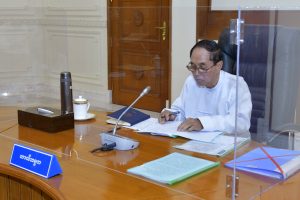Myanmar’s military government yesterday announced that it will extend the nationwide state of emergency for another six months, most likely delaying the sham “elections” that it was expected to hold by August.
“Sovereign power of the state has been transferred to commander in chief again,” acting President Myint Swe said in an announcement that was made public via reports in state-run media outlets, referring to coup leader Senior Gen. Min Aung Hlaing.
Myint Swe spoke at a meeting in the capital Naypyidaw of the National Defense and Security Council (NDSC), which brings together senior members of the military and government and was convened yesterday and Tuesday to assess the political and security situation in the country.
The announcement came on the second anniversary of the military coup, which the anti-junta resistance marked by calling a “silent strike” and requesting the public stay home to communicate its opposition to the coup government. The vistas of empty tarmac that appeared on social media testified to the broad popular opposition to the armed forces, and the difficulties that it faces in convening an election designed to launder and legitimize military rule.
This is the third six-month extension that the junta has announced since it seized power in February 2021. “Although according to the section 425 of the constitution, (a state of emergency) can only be granted two times, the current situation is under unusual circumstances and it is suitable to extend it one more time of six months,” Myint Swe said at the meeting.
Initially, the military-backed State Administration Council (SAC) said that it would hold power for one year, after which it would convene elections. However, the military takeover has been met with nearly overwhelming resistance from the Myanmar population and has inflamed pre-existing ethnic conflicts around the country’s periphery, complicating any effort to stage an electoral transition to a less direct form of military rule.
Indeed, the extension seemingly represents an acknowledgment that it is impossible to convene an election in the current state of political and economic collapse. The military’s control over large parts of the country is either non-existent or contested, leaving relatively few areas in which it could guarantee secure polling. This is true even in parts of central Myanmar that have historically been seen as bastions of support for the military, where anti-regime militias known as People’s Defense Forces (PDFs) have made large swathes of territory inhospitable to the uniformed armed forces.
A statement issued after Tuesday’s NSDC meeting blamed anti-military resistance groups for “committing killings of innocent people, blowing up public places, imposing armed intimidation and coercion on the people.” Senior security officials were more explicit about the challenges during a recent “counter-terrorism” meeting, the minutes of which were leaked and published by exile media outlets.
At the meeting, senior officials noted that the regime was failing to secure public support for its attempt to defeat the shadow National Unity Government (NUG), and that the PDFs, which are loosely aligned with the NUG, had expanded beyond the junta’s control. None of the officials present at the meeting was confident the regime would be able to successfully hold an election by August.
This was something that Min Aung Hlaing appeared to acknowledge at yesterday’s NDSC meeting, which was paraphrased as saying, “Only when peace and stability prevail all over the country and there is a situation where everything is normal, will it be possible for general elections to be held in all parts of the country.”
Whether another six months will make any appreciable difference to the feasibility of the junta’s election plans, however, remains very much in doubt.

































